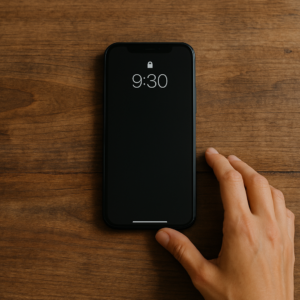Phantom Checking: Why You Keep Looking at Your Phone (Even with No Messages)
Have you ever caught yourself unlocking your phone, staring at the screen… only to realize there’s nothing new? No messages, no notifications, nothing waiting for you. Yet you keep checking again and again.
If this sounds familiar, you’re not alone. This behavior has a name: Phantom Checking. It’s one of the most common yet least talked-about habits of our generation.
This blog will explore:
-
What phantom checking is and why it happens
-
The hidden impact it has on your mind, body, and relationships
-
Science-backed insights on dopamine and habit loops
-
Practical, holistic steps to break free and reclaim peace
🌟 What is Phantom Checking?

Phantom checking is the habit of repeatedly checking your phone for new messages, notifications, or updates—even when there are none.
Unlike intentional phone use (replying to an email, sending a message, scrolling through news), phantom checking is almost automatic. Your hand reaches for the phone without thinking. Your brain anticipates something new… but usually, there’s nothing.
Over time, this turns into a cycle:
Boredom, stress, or a free moment → Phone checking (anticipation of reward) → No reward → Still repeat.
It’s similar to scratching an itch that isn’t there.
🧠 The Science Behind Phantom Checking
The root of phantom checking lies in dopamine, the brain’s “reward chemical.”
-
Each notification = dopamine hit.
When your phone buzzes, your brain releases dopamine, making you feel rewarded. -
Anticipation matters more than reward.
Studies show that dopamine spikes not only when you receive a reward, but also when you anticipate one. So even without a notification, your brain keeps pushing you to check. -
Habit loops form.
Charles Duhigg, in The Power of Habit, explains how cues trigger routines that lead to rewards. For phone checking:
Cue = boredom/stress → Routine = unlock phone → Reward = maybe dopamine (if there’s something new).
Even if the reward is missing, the loop continues.
📊 Research Insight: A 2015 study by Andrews et al. found that the average smartphone user checks their phone 85 times per day—often without realizing why. Another study from Deloitte (2016) reported that people check their phones every 4 minutes on average during waking hours.
📉 The Hidden Impacts on Mind and Health
At first glance, phantom checking seems harmless. But over time, it shapes your mental state, focus, and even physical health.
1. Mental Fog & Poor Focus
Constant checking breaks your flow.
Research from the University of California found that it takes 23 minutes to refocus after a distraction. Imagine this multiplied across the day.
Phantom checking makes your brain restless, always anticipating the next “ping.”
2. Anxiety & Restlessness
Psychologists call it FOMO (Fear of Missing Out).
The silence of no notification makes you anxious, so you check again.
Over time, this creates low-level chronic anxiety—subtle, but draining.
3. Reduced Real-life Connection
You might sit with family but find your eyes darting to the screen.
In relationships, this signals disinterest—even if unintentional.
Studies show that even a phone placed on the table (without being used) reduces the depth of conversation and emotional bonding.
4. Sleep Disruption
Phantom checking often happens before bed.
Blue light and constant stimulation interfere with melatonin, the sleep hormone.
Poor sleep = weaker immunity, dull skin, irritability, and poor focus.
5. Physical Health Toll
Constant micro-checking strains your neck and eyes (“tech neck”).
It also keeps your body in a low-level stress mode, raising cortisol levels.
💔 Emotionally, phantom checking creates a sense of emptiness—like reaching out for connection and finding none.
🌿 The Emotional Side: Why It Hurts More Than We Admit

Let’s be real—our phones are more than gadgets. They’re lifelines to friends, family, work, and even self-worth.
So when we keep checking and finding nothing, it’s not just about the screen—it’s about a subtle feeling of being unwanted or unseen.
👉 Deep down, “No new messages” can feel like “Nobody cares about me right now.”
This emotional undercurrent is why phantom checking can leave you drained.
🔄 Breaking Free: A Holistic Reset
The good news? Phantom checking isn’t permanent. Like any habit, it can be rewired. Here’s a step-by-step, holistic recovery guide—backed by research and infused with mindfulness.

1. Awareness is the First Step
Track how often you check your phone.
Apps like Digital Wellbeing or Moment show daily unlock counts.
Awareness helps you break autopilot mode.
2. Delay the Check
Next time you feel the urge, pause for 10 seconds.
Take 3 deep breaths.
Often, the urge passes.
This builds dopamine tolerance—training your brain not to crave instant hits.
3. Create Phone-Free Zones
-
No phones at dining tables.
-
Keep your phone outside the bedroom.
-
Use an alarm clock instead of relying on your phone.
📊 Research shows leaving your phone in another room can boost focus by 26% (University of Texas, 2017).
4. Rewire with Replacement Habits
Instead of checking your phone when bored, try:
-
A short walk 🚶
-
Deep breathing 🌬️
-
Writing one thought in a journal ✍️
-
Stretching your body 🙆
Over time, these replacements form new, healthier loops.
5. Mute the Noise
Turn off non-essential notifications.
Keep only urgent ones (calls, messages).
The less your phone buzzes, the less your brain craves.
6. Practice Real Connection
Make a conscious effort to look into people’s eyes when talking.
Replace emojis with actual hugs, smiles, or calls.
Every real connection fills the emotional gap that phantom checking tries to soothe.
7. Mindful End-of-Day Ritual
An hour before sleep, put your phone aside.
Replace it with calming rituals:
-
Herbal tea ☕
-
Reading 📖
-
Gratitude journaling 🌸
This resets your nervous system and improves sleep quality.
🌸 A Gentle Reminder
Breaking phantom checking isn’t about shaming yourself. It’s about understanding that your brain is wired for reward, and tech companies design apps to exploit this.
So if you catch yourself checking for the 10th time in an hour, smile and remind yourself:
✨ I’m human. My brain is craving, but I choose peace instead.
🪷 Yeka Wisdom
Your glow isn’t in a buzzing phone.
It’s in calm breaths, real conversations, and presence.
Notifications fade, but inner peace stays.


Leave a Reply